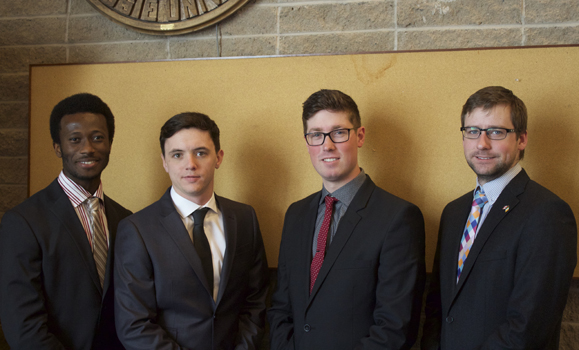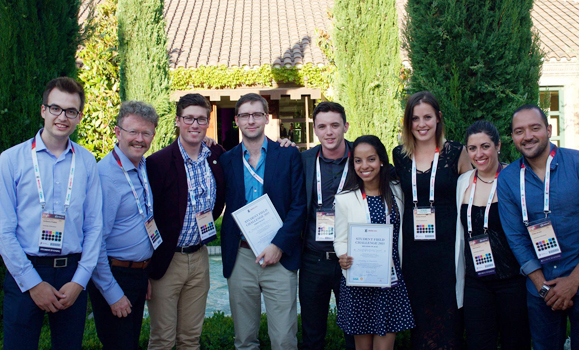In an inspiring feat from Dalhousie‚Äôs Department of Earth Sciences, a diligent team of undergraduate and graduate students worked around the clock for months, determined to secure seats at the 77th Annual International Fully Integrated Evaluation and Development (FIELD) challenge held in Madrid, Spain in June. ¬Ý
¬Ý‚ÄúThe coffee was kept percolating and the computers kept humming,‚Äù said Charles Carlisle, a ∫⁄¡œ≥‘πœÕ¯FIELD challenge team member and master‚Äôs student in Earth Sciences. ‚ÄúWhile working on the FIELD challenge, our team members pulled in every resource and piece of knowledge they‚Äôve picked up over their years of study in the geoscience field and get it in one place.‚Äù
To say the work paid off would be an understatement: the team won first prize at the competition, hosted by the European Association of Geoscientists & Engineers (EAGE) at its annual conference and exhibition. All members of EAGE are professionals or students in geophysics, petroleum exploration, geology, reservoir engineering, mining¬Ýand mineral exploration, civil engineering, and tunneling and environmental matters.
A team effort
Dalhousie’s team included students from both the Department of Earth Sciences and the Faculty of Engineering. Carlisle, Darragh O’Connor, Connor Wentzell, Kenneth Martyns-Yellowe, and R.J Victor McLafferty met while working in Professor Grant Wach’s Basin and Reservoir Lab. The five would go on to prove their commitment to the fields of geoscience and engineering, first by winning two other competitions earlier this year to secure their place in the FIELD challenge.
The first was an essay competition, intended to test teams from around the world on their professionalism.
“The essay submission covered a very important topic in the industry: ethics,” said Wentzell, member of the team and undergraduate student in Earth Sciences. “With increasing pressure from the public, it’s important that industry professionals are always representing themselves properly, working with proper ethics and due diligence.”
The second competition was an online quiz that tested the teams’ knowledge of geoscience. Teams were required to answer 20 questions in just 20 minutes, a daunting task for any expert. With one minute assigned per question, the team worked quickly and earned first place in that competition as well.
“Our students in Earth Sciences and Engineering never cease to amaze me,” says Dr. Wach. “Self-directed competitions such as the EAGE Field event bring out the best in our students. They drive themselves to achieve excellence and epitomize what we seek to accomplish with our educational efforts through experiential learning.”

FIELD Challengers Kenneth Martyns-Yellowe, Darragh O'Connor, Connor Wentzell and Charles Carlisle suited and booted prior to FIELD Challenge competition. (Not pictured: Victor "RJ" McLafferty).
Global networking and strong partnerships
Fast forward to June this year, and the team found themselves overseas in Madrid for the FIELD challenge, ready to compete for the coveted title of best geoscience and engineering student team in the world. The team’s trip was sponsored in part by Shell Canada Ltd., who donated funds to the trip through its Campus Ambassador Program. (Shell International also supports the EAGE FIELD challenge.)
The team's task: to analyze and propose a FIELD development plan for a discovered hydrocarbon resource. The project involved analysis of seismic data and production records of an existing gas field. The team was required to devise a plan of action for the safe recovery and sale of any remaining natural gas.
Using a data set provided by the Spanish energy company, Repsol S.A., the plan included five key components: a well log analysis, a structural model, identified flow units, static reservoir model property modeling and a dynamic reservoir model.
“Although we had only spent a number of weeks deciphering this dataset, commercial operations would normally spend months interpreting them,” said Carlisle. “It’s not often that students get to see and play with real-world data — this truly was an experience that will stay with us.”
International exposure
Their final plan was presented to a jury of academic and industrial experts, including members from other presenting university teams. ∫⁄¡œ≥‘πœÕ¯came out on top, winning the competition and receiving international recognition. The team also secured a ‚Ǩ 3000 voucher for the Earth Sciences Department that will fund field trips and student academic events, as well as help establish a ∫⁄¡œ≥‘πœÕ¯EAGE chapter on campus this fall.
While winning the FIELD challenge was the first key milestone in these students’ blossoming careers, there’s something to be said about the exposure it gave them to experts around the world, too.
“The EAGE is a professional society that brings members of the industry together,” says Wentzell. “Although its origins are European, members today come from all over the world. The challenge was a great opportunity to not only expand my industry-related skills and experiment with new material, but also offers an excellent networking opportunity.”

FIELD Challengers from ∫⁄¡œ≥‘πœÕ¯ and University of Barcelona meet with EAGE President Philip Ringrose (2nd from left) and EAGE Student¬ÝAffairs Co-Ordinator¬ÝKirsten Brandt (3rd from right) after being awarded 1st and 2nd place respectively.

